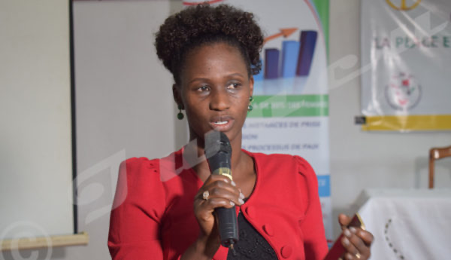Women journalists championing an engendered media in Burundi
Submitted by fkakooza on

Like in many African societies, Burundian women face numerous obstacles to development and active participation in public life. Culturally, girls are expected to engage in household activities instead of going to school, and those that have the chance to study are undermined by their employers.
In 2003, women journalists in Bujumbura formed the Association of Women Journalists (AFJO) to promote women’s rights through the media and promote gender equality in Burundi’s media. Since then, AFJO has been actively working to promote the effective participation of women in Burundi’s media. They train journalists and other activists on media activism and monitor government policies.
Through interaction with executives of AFJO, women are encouraged to fight for their rights using media to express and voice their feelings fearlessly. According to Desire Ndanziza, the Executive Secretary of AFJO, access to media is open for women but some of them don’t take advantage of that opportunity. He says, “For women journalists, AFJO has strengthened their capacity to integrate gender into media productions. For media managers, AFJO has made them aware of women's rights and the importance of integrating women into positions of responsibility. For decision-makers, AFJO carried out advocacy actions to ensure that women are better represented in decision-making positions, because if women are in positions of responsibility, they are more likely to have access to the media.” Fidelity Ishatse is a beneficiary of AFJO’s training on gender. She owes her gender awareness and sensitivity to the many capacity building sessions, as well as the coaching and consultancy received from AFJO. She is now a member of the association.
AFJO has successfully produced various radio and television programs, including documentaries on critical issues facing women such as sexual violence, harmful cultural practices and legal violations. They are also part efforts in the Great Lakes region to advocate for women voices to be heard in the media. In 2012, they formed the “Raising women voices to media” network in partnership with Search for Common Ground, an NGO operating in Burundi, Rwandan Women Media Association (ARFEM) and Congolese Women Media Union (UCOFEM). The main objective of the network is to raise and promote women’s rights in the media and by the media, so that their problems may be taken into consideration.
Meanwhile, Burundian culture prevents men from exposing the lives of women, and so women rarely express themselves in the media. This leads to Burundian women journalists not being sufficiently represented. According to Diane Ndonse, the Chairperson of AFJO, out of the 1,420 journalists who registered with the National Communication Council (CNC) to get press cards in 2019, only 32 percent were women. The CNC is Burundi’s media regulator. Unfortunately, the Burundian press law does not specify the rate of women representation in the media. AFJO contends that media officials underestimate women and they believe that women cannot report on the battle field, they are lazy and incapable of working like men hence their low representation.
Needless to say, women need affirmative action in order for them to participate in some activities and jobs. As such, AFJO urges government to adopt the law to increase the representation of women and young people in the media. Further, media officials need to grant internships to young people so that they integrate into journalism. Perhaps if women’s voices are heard in the media, the problems that they endure will be known and understood, their work on political issues will be noticed and their political participation will be acknowledged.The AFJO still faces a few challenges while assisting female journalists. “The cultural weight still weighs on the female journalist and the Burundian woman, overload of housework for women, the low representation of women in decision-making positions, low self-esteem in some women, some media managers are not sensitive about gender mainstreaming in media work, the persistence of gender-based violence and the phenomenon of sexual harassment which remains a taboo in the workplace,” says Ndanziza.
- 697 reads
